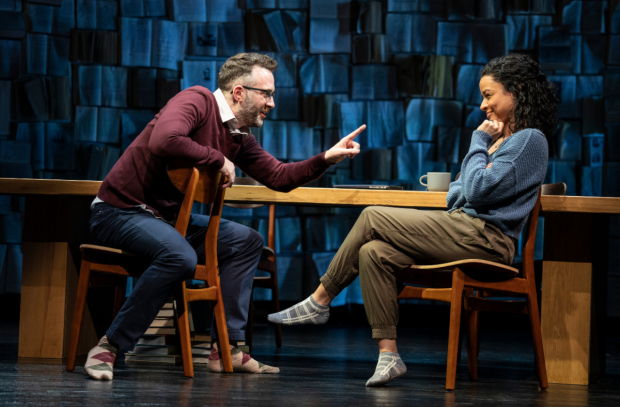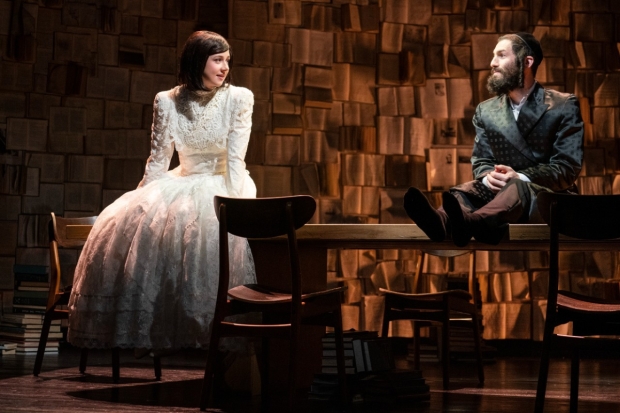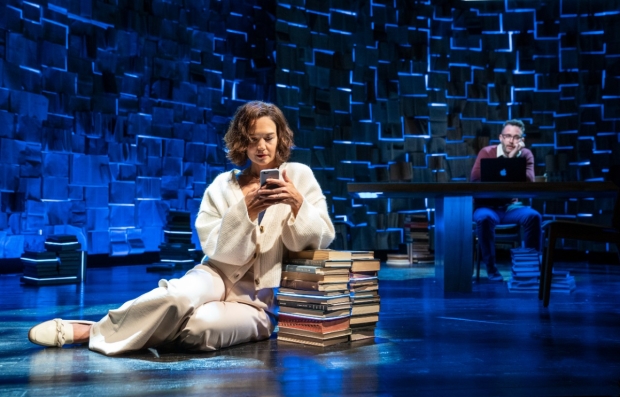The Wanderers Asks If a Shiksa Movie Star Could Ever Be a Jewish Boy's Bashert
The new play by Anna Ziegler at Roundabout Theatre Company stars Eddie Kaye Thomas, Sarah Cooper, and Katie Holmes.

(© Joan Marcus)
There are heavy-handed Hebraic connotations in a title like The Wanderers, Anna Ziegler's new play commissioned by the Old Globe and making its off-Broadway debut with Roundabout Theatre Company. But don't let a seemingly inelegant title shake your faith in Ziegler. She isn't conjuring a contrived image of Israelites trekking through the desert for 40 biblical years for nothing. And if you leave confident in the protection of a cosmic order, you haven't been listening closely enough.
In keeping with Jewish tradition, The Wanderers asks more questions than it answers, and the field of inquiry spans faith, family legacy, incurable dissatisfaction, and the true meaning (if there is one) of bashert (the Yiddish term encapsulating the idea of destiny, particularly for soulmates). The play's spidery reach in these varied philosophical realms is moderated by a concentrated plot, directed with clarity and just enough sentimentality by Barry Edelstein.
In 2015 Albany, we meet married couple Abe (Eddie Kaye Thomas, permanently linked to the American Pie film series) and Sophie (Sarah Cooper, made famous by her early-Covid TikToks, but a fine actor in her own right). Abe is an accomplished Jewish author enamored of Philip Roth who diffuses his performance of cerebral genius with self-deprecating humor. His half-Jewish wife, Sophie, whom we learn he has known since childhood, is a less-accomplished author, and cloaks her self-doubt in wry aloofness and domestic tasks, all the while hemming and hawing about writing another novel after the disappointing reception of her last one.

(© Joan Marcus)
Their marriage is presented in parallel with that of Schmuli and Esther (Dave Klasko and Lucy Freyer, respectively) — an arranged couple born into Satmar Hasidism who start their divinely ordained family in 1970s Williamsburg. Their scenes are prefaced with chapter titles (projection design by Joey Moro), so it's not particularly difficult to suss out who they might be and who might be the hand behind their written narrative.
As is always the case with writers, everything is copy (to borrow Nora Ephron's famous turn of phrase), but we're reminded that everything is also story, as set designer Marion Williams exudes in her awe-inspiring wall of books and papers that serves as the play's continuous backdrop. Sophie and Abe, clearly in a marital slump, frequently return to their origin story to confirm the meant-to-be-ness of their union. Esther, meanwhile, illicitly absorbs modern ideas from books and mainstream media, and begins questioning whether reclaiming control of your life is the same thing as defying God's will.
Life for all four characters is an inscrutable mix of reality and narrative — and who better to embody this liminal space than a movie star? Enter shiksa goddess Julia Cheever, played by Katie Holmes with the effortlessly enthralling presence that explains the irrationality of all parasocial relationships. After Julia attends one of Abe's readings, an email from her appears in his inbox (the first of a prolonged and shrouded correspondence), feeding Abe's most clichéd fantasies and unraveling many of the narratives that have kept him chugging along.

(© Joan Marcus)
As Ziegler has proven in past plays like Actually and The Last Match, she is an expert at the introspective two-hander. The Wanderers boasts a cast of five, but sticks to Ziegler's tried-and-true two-person scene structure: Freyer beautifully depicts Esther's slow untethering from her community against Klasko's rendering of a dutiful and scared Schmuli; Thomas, as Abe, meets Cooper's Sophie with a balance of charm and nihilistic despair, while Cooper volleys back with pointed jabs and aimless desperation; and Holmes's Julia Cheever is just ethereal enough to explain Abe's spiral into fanboying madness (costume designer David Israel Reynoso speaks volumes through his work, from Schmuli and Esther's traditionally conservative wardrobe to Julia's gleaming white ensembles).
There is brimming tension and beautiful lyricism in each of these head-to-head moments. Still, there is a slight sense of flatness that this revolving door of paired scenes creates within a play whose ideas are bursting with three-dimensionality. Though perhaps that is simply the requisite tradeoff for a big story told in an intimate way. The couples we follow through their wandering journeys are trying to reconcile their belief in destiny with an elusive sense of contentment. The thought of a bashert, be it a person or a life path, is a comforting concept that leaves no room for the creeping suspicion that we may have chosen wrong. But is your bashert inscribed in the universe by God, or is it simply determined by the familial patterns and traumas you can't help but relive? All we can be sure of is there aren't enough beautiful goyishe movie stars in the world to rewrite a family's Genesis tale.









